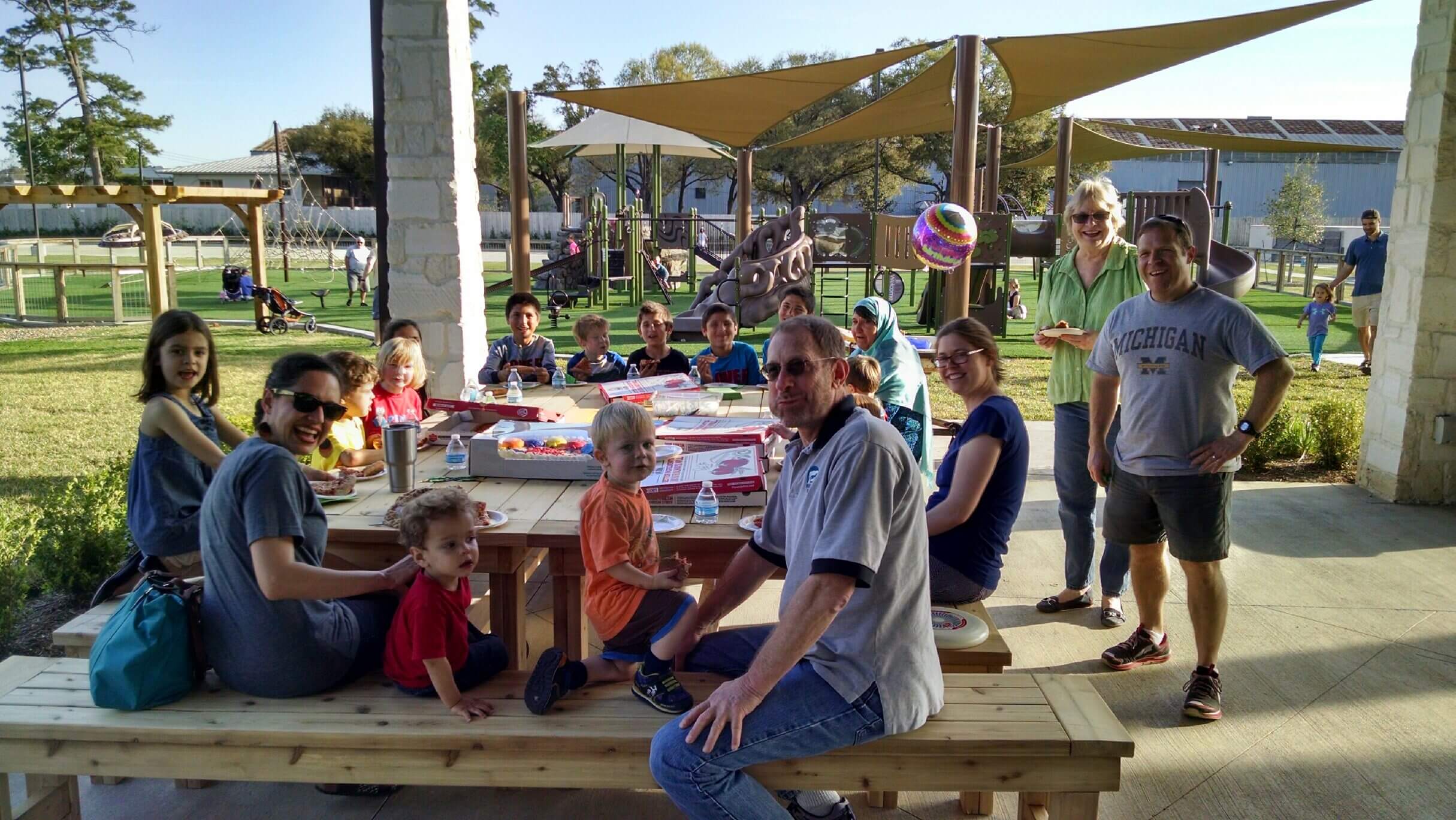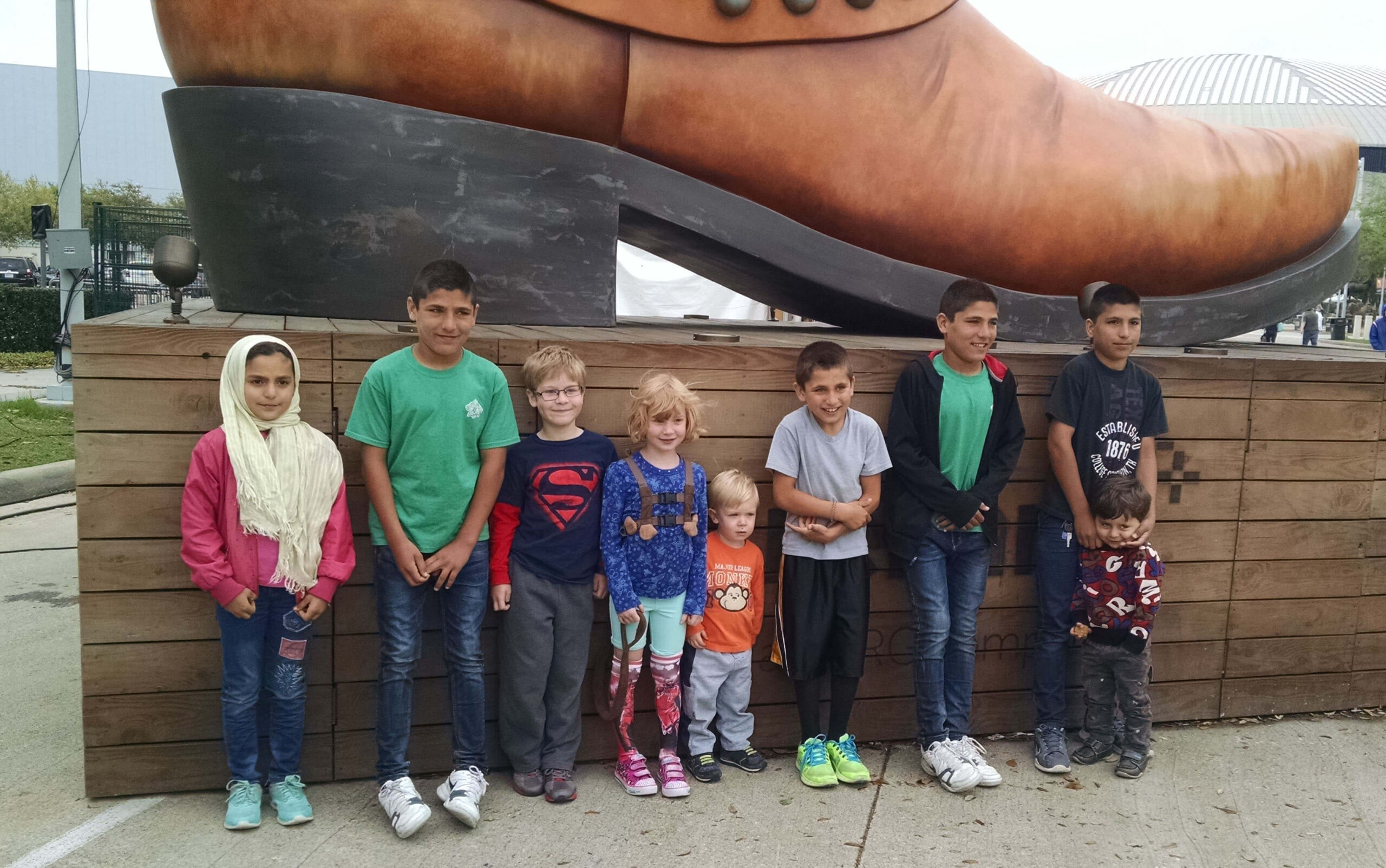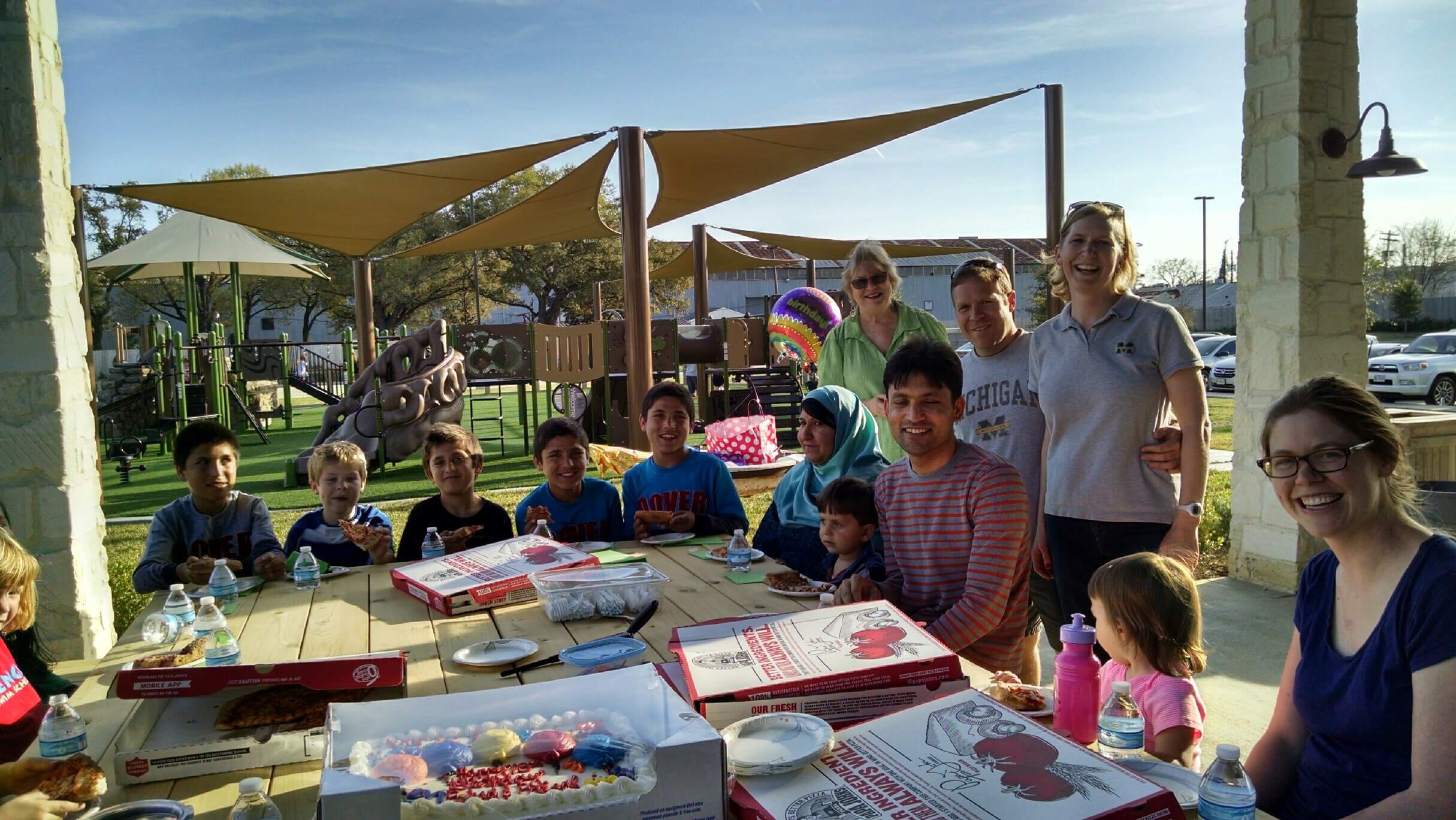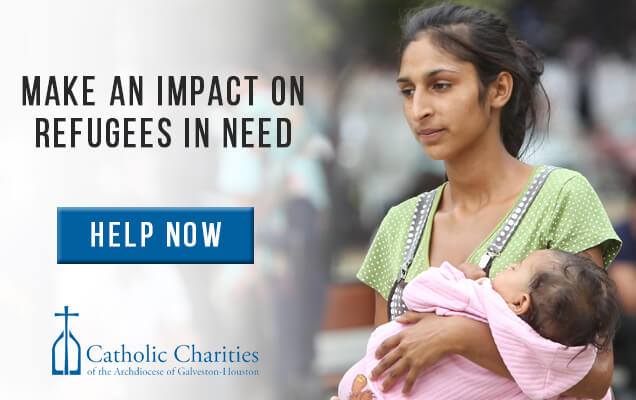This article originally appeared in the Fall 2016 Good News Now Newsletter. Read the full newsletter here [PDF].
When Mark and Katherine Griffin wanted to make a specific impact on the refugee community, Catholic Charities put them in touch with the Noors, a refugee family from Afghanistan. Despite culture differences and language barriers, the Griffins hoped initiating a friendship with a single family could make a difference in a small, yet meaningful way.
Read what the Griffins had to say about their experience and what the Noor family taught them:

The Griffin family welcomed the Noors, a refugee family from Afghanistan, by not only helping them with life’s necessities but also opening their hearts to friendship.
How did you become involved with Catholic Charities?
My workplace is very involved in the United Way. My husband and I made the decision that we wanted to get involved with the refugee community in a very specific way, so I explained to our United Way coordinator what we wanted to do, and asked if she could put me in touch with a charity that could help us. She put is in touch with Catholic Charities, and the rest is history! The agency has been very responsive in helping us match our desire to help with a family who could benefit from that help – so thank you!
What made you decide to help a family? Have you done that before?
Our family has always supported various charities financially, but we wanted to give in a way that felt more personal. Both my husband and I work full time and we have three young children, so we wanted to be mindful of finding opportunities that allowed us to share the experience with our children and on a flexible schedule.
We want our children to grow in their empathy for others, and to hold an appreciation for all the privileges they enjoy, that most of us take for granted.
So getting to know a family with other children seemed like a good match.
We chose to become involved in the refugee community, as it felt like a population that we could most easily understand the factors that led to their need for help. We enjoy great stability and peace in the United States, but had we been born somewhere else in the world, we could easily find ourselves in similar circumstances. Sometimes the amount of need in the world can seem overwhelming, and our ability to make a difference feels futile. We hoped that by initiating a friendship with a single family and investing in that family we could make a difference in a small, yet meaningful way.
Describe your experience with the Noor family.
The time we have spent with the Noors has been an incredible experience for our whole family. We started out by gathering a list (from Catholic Charities) of some of the things that the family needed before we met with them. One of the items that they needed were shoes. The Noors have six children, and so we decided to take them to Academy Sports + Outdoors to buy sneakers for everyone. We were all set to get everyone measured when we arrived, but the Noors insisted on buying shoes that were a couple of sizes too big so that the children would have room to grow. This was just the first of basic assumptions that we are continually challenged with in our interactions with the Noors. They are so very careful with their limited finances, and so it really is a pleasure to help them with some of the “extras” that are beyond their budget.
After our first visit, I shared the rest of the list of items that they needed on our neighborhood Google group. An unbelievable amount of donations poured in from our neighbors; we had to recruit a neighbor to help us haul the load to their apartment. We filled an entire minivan and SUV! Through this, we had the opportunity to meet a few neighbors that we did not now, as they dropped donations off at our house and asked about our efforts to help. It was humbling to see how much “extra” we all have, and very satisfying to share it with a family that could really use it.

The Griffins took the Noor family to the Houston Livestock Show and Rodeo in March 2016.
Since then, we have alternated visiting with the Noors at their apartment or hosting them at our house for lunches, and taking them out to experience different things in Houston. In March, we took them to the Houston Livestock Show and Rodeo. It was certainly interesting to experience some local culture through their eyes! Also, birthdays are not normally celebrated in Afghanistan, so when their twin boys turned 13, we threw them an American-style birthday party at a park playground, complete with pizza, cake and presents.
The meals the Noors have served us when we visit them for lunch have been phenomenal. In their culture, extended families live together, and they often invite large groups to dine with them. So Wazeera (wife/mother) is accustomed to cooking for a large crowd.
What was the biggest challenge?
Definitely the language barrier. Only Iqbal (husband/father) speaks English fluently. It is amazing to watch our children play together, though, completely unhindered by what we would consider a lack of ability to communicate. Gesturing goes a far way. Wazeera is particularly quiet, so I have been working to learn their native language Pashto in hopes that I can help bridge that gap and get to know her a bit better.
What was the best/most rewarding part of your experience?
There are a few things: Getting to step outside our comfort zone to experience a new culture and get to know a family from such a completely different background, while only traveling across town, and getting to share this experience with our children in one go.
Whenever we say goodbye to the Noors, we are filled with a remarkably deep sense of fulfillment. There’s something about reaching far outside of yourself that is incredibly rewarding.
We have heard that the biggest single factor for refugee families settling successfully is having a personal connection with someone already established within the community. We hope we can help the Noors achieve that success.
You mentioned you were learning a new language. What has that been like?
Challenging – definitely! I enjoyed studying foreign language while in school – I even continued in my studies to get a minor in German while in College. However, Pashto is an Arabic language, so I can’t even read the letters!
I really enjoy practicing my very limited Pashto when we visit with the Noor family. The children, particularly, seem to find it amusing. It gives me an appreciation for what they are experiencing, and particularly how difficult it is to acquire a new language as an adult! Afghans represent the single largest refugee population in the world, so my hope is that by investing in learning Pashto, I will be uniquely able to provide meaningful assistance to additional Afghan refugees in the future.

Since birthdays are not normally celebrated in Afghanistan, the Griffins threw an American-style birthday party for the Noor family’s 13-year-old twin boys at a park playground, complete with pizza, cake and presents.
What have you learned from the Noor family?
The Noors have given me an appreciation for how very little we actually need. Iqbal only makes about $300 more per month than rent for his family, but he manages to provide everything they absolutely need. The children are friendly and happy. Iqbal works a night shift so that he can be around to help his family as they need him during the day, since he is the only English speaker (doctor appointments, school appointments, etc.). He has enrolled in the community college to obtain a college degree so that he will be able to get a better job in the future. It is inspiring to watch him and his family work so hard to make a life for themselves here.
You mentioned wanting to help another family. What drove your decision to want to continue helping?
At the end of the day, I would like to leave a legacy that is just a little bigger than those immediately around me. The amount of time/energy/finances that we are putting into this effort, I hope, can have a lasting impact that is so much greater than what we put into it. And I hope that at the end of the day, we may have made the world just a tiny bit better than it was before, at least to a few families.
What do you want other people to know?
God loves all his people. I think every major religion calls for its followers to show mercy and love to one another. What we are doing is nowhere near radical, but I believe it’s a step in the right direction. If more people made a conscious effort to make a difference, I think we could actually make this world a better place.

